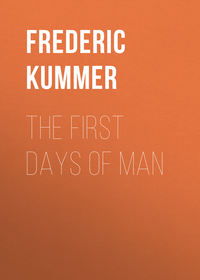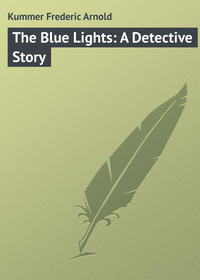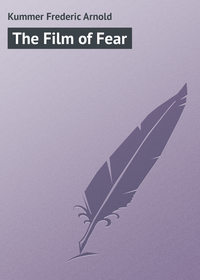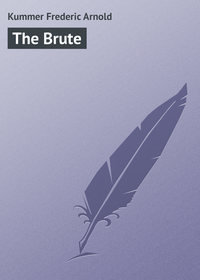 полная версия
полная версияThe Green God
The Sergeant's testimony was extremely thorough and exact. He showed conclusively that no one had descended from the porch roof to the ground either by the vines, or by the lightning rod which I had foolishly supposed he had not observed, the day we made our first investigation. He spoke of the woman's footprints in the gravel path, from the corner of the porch to the main entrance. He then took up our trip to London, put in evidence the letter he had received, supposedly from me, summoning him to meet me at the house in Kingsgate street, explaining that the Chinamen had no doubt been uncertain whether I had the stone or had turned it over to him, and to avoid taking chances had decoyed us both. He referred to my offers of assistance in unraveling the case, and my failure to mention to him my suspicions regarding the Oriental perfume, or my taking of the cake of soap from the green room. He described Li Min's attempt to steal my satchel, and my facetious remark that possibly the Chinaman thought I had the emerald in my bag, which was indeed the case. Finally he spoke of the finding of the emerald in the cake of soap in my satchel and the weapon in the drawer of the dresser in my room, by his assistants, and the latter was produced and placed along with the other exhibits in the case. When McQuade had got through it was perfectly clear to the court that someone within the house had left the telltale marks on the roof and window sills and it seemed pretty conclusively shown that that someone was myself. I arose to be examined with a sinking heart. I knew that before now, in the history of criminal trials, many an innocent man had gone protesting to the gallows, and already I felt sure that, unless Miss Temple's testimony was decidedly convincing, I was certain of being held for trial as either an accomplice or the principal in Robert Ashton's murder.
My own examination was short. I told my story as the reader already knows it, and I told it without any hitch or hesitation. If my reasons for taking the cake of soap from Ashton's room seemed weak, I could only inform the magistrate that they were nevertheless the ones which had actuated me. If my failure to speak of the matter to McQuade seemed suspicious, I could only say in reply that I had not thought it of sufficient importance to mention to him. I testified that I had last seen Miss Temple, on that fatal night, when she bade me good-night in the lower hall, and that I did not see her again until the next morning when she came into the hall in answer to my cries. I described minutely the manner in which I was awakened by the short, sharp cry of the murdered man, and the sound of his heavy fall, and fixed the time as not later than half-past five, as I had looked at my watch, mechanically, while hurriedly throwing on my clothes. I felt that I had made a favorable impression, but I realized that the stern facts brought out by McQuade would need more than a favorable impression to overcome them. At the conclusion of my testimony I requested that the Chinaman, Li Min, be called to corroborate me as to the removal of the cake of soap from the green room. The Chinaman was already in the witness room, but, when brought into court, maintained a stolid silence, and even the most strenuous efforts of an interpreter failed to elicit from him a single syllable. It was at this point that the court adjourned for luncheon, after which the examination was to be resumed, with the hearing of Miss Temple's testimony.
As may well be imagined, I had no desire for food. Nor were my concern and inward fear of the afternoon's proceedings a result of any fear that I may have had upon my own account. I realized fully that the testimony of the morning had been heavily against me, but I would have gladly endured that and much more, could I have spared Muriel the coming ordeal. The thought that she might be coming to Exeter to confess, and thus free me from all suspicion, distressed rather than cheered me. That she had evidence of importance to put before the court I well knew. Yet whom could it possibly involve but herself? The Chinaman, Li Min, she could have no possible motive, I felt, for screening, and the only other person for whom she could possibly have such a feeling, her father, had been in no way connected with the crime, and clearly could not have committed it. The more I thought, the more I realized that logic pointed its cold and inexorable fingers at her; yet the more strongly did the love I felt for her tell me the impossibility of such a conclusion. I cannot express the tenderness, the love, with which this girl, in our few brief meetings, had inspired me. I longed to take her into my arms and comfort her, and tell her that the whole thing was but a wretched, miserable dream. Yet it needed but a glance at the stone walls about me, the steel grating of my door, and the untasted food which stood upon the cot at my side, to assure me that this was indeed no dream, but a very cold and stern reality. It was close on to two o'clock when I was once more taken back to the court-room, and, as I entered, I glanced about with an eager and expectant look, hoping to see Miss Temple. She was nowhere to be seen. I took my seat and waited patiently, watching the court attendants as they performed their routine duties, or the Magistrate, deep in the business of reading and signing a number of papers – warrants, I presumed, for other unfortunates – which were handed to him by a clerk. Major Temple sat in his former seat, so pale and still that I felt he had not left it since the morning, yet I knew he must have done so, if only to catch a glimpse of his daughter as she arrived in the custody of the officers. Presently there was a stir in the room, the Magistrate left off signing his papers, and, as I turned toward the door leading from the witness room, I saw Muriel entering, with Sergeant McQuade at her side, and Inspector Burns following them. My heart sank, as I saw how terribly pale and distressed she looked and with what shrinking she met the gaze of the many eyes now focused upon her. Her own sought the face of her father. He half-rose, as though to speak, then sank back into his seat and covered his eyes with his hand. She did not see me at all – probably because I was so close to her.
The Magistrate rapped upon the desk to still the rising buzz of conversation among the spectators, then, turning to the witness, for whom McQuade had placed a chair, began his interrogations. After she had taken the oath, and answered the usual formal questions as to her name, age, etc., he began.
"Miss Temple, you have been arrested in connection with the murder of one Robert Ashton, which occurred at your father's house on the morning of Tuesday last. The object of this hearing is to fix the responsibility for that crime, so far as we can, pending a trial by jury. Tell the Court, if you please, where you first met the deceased."
"In Hong Kong," replied Miss Temple, in a scarcely audible voice.
"Speak a little louder, please. When was this?"
"Last year – in October."
"He addressed you at that time, did he not, upon the subject of marriage?"
"He did, several times."
"What was your reply?"
"I refused his advances."
"Why?"
"I did not care for him, in fact, I disliked him."
"You had a strong aversion to him?"
"I had. He seemed to me cruel and unscrupulous."
"Did your father know of this feeling on your part?"
"No. I did not say anything to him about it. He evidently liked Mr. Ashton, probably because of their common interest in Oriental art. I had no wish to prejudice him."
"When did you first learn that your father had consented to your marriage with Mr. Ashton?"
"Shortly after our return to England. He told me that Mr. Ashton had asked for my hand in marriage, and offered to secure the emerald Buddha for him as an evidence of his love and sincerity. My father, supposing that I would have no objections, foolishly consented to the arrangement."
"But you objected?"
"Violently at first. Later on, when I saw how deeply my father felt about the matter, and when he told me he had given Mr. Ashton his word of honor, and that the latter had set out upon a life-and-death quest as a result of it, I gave an unwilling consent and agreed to write to Mr. Ashton at Pekin, withdrawing my objections to his suit."
"You wrote this letter?"
"I did."
"When did you first learn that Mr. Ashton had succeeded in his quest?"
"At dinner, the night of his arrival. I had not been alone with him, since he came but a short time before the dinner hour. He suddenly rolled the emerald out upon the tablecloth, and looked at me with a glance of triumph."
"After dinner you had some conversation with Mr. Morgan. What was it?"
"I told Mr. Morgan my story. He was a stranger to me, but I knew his name and his work, and I had no one upon whom I could rely. I told him I would never marry Mr. Ashton, that rather than do so I would leave the house, and earn my own living. I asked him to help me in any way that he could."
"And he agreed?"
"Yes."
"What did you do then?"
"I retired to my room, dismissed my maid, and threw myself fully dressed upon the bed."
"What time was it?"
"Close to ten o'clock. I heard the hall clock strike the hour shortly after I reached my room."
"Did you go to sleep?"
"No. I thought and thought about the terrible situation I was in. I did not want to leave home. I am very fond of my father – he is all I have in the world. Yet I could not make him listen to reason, in regard to this marriage. He was mad to possess this miserable jewel. At last I heard my father and Mr. Ashton come up stairs, and, shortly after, heard my father retire to his own room. I made up my mind to make a last appeal to Mr. Ashton, to tell him under no circumstances to deliver the jewel to my father under the impression that I would marry him, that I would refuse to do so. I wanted also to ask him to give me back my letter and to release me from my unwilling promise. I sprang from the bed, ran out into the hall, and, without thinking of the consequences, went at once to the door of Mr. Ashton's room and knocked. He opened it at once, and, fearing lest I might be seen or heard, by someone if I remained standing in the hall, I entered. Mr. Ashton had evidently been examining the emerald, as I saw it standing upon a table. He had a pen in his hand, and was making a copy of the curious symbol engraved on the base of the image, upon a small piece of paper. He received me with protestations of joy and evidently thought that I had come to him as his accepted wife, but I soon undeceived him, and, after stating my case in a few words, demanded the return of my letter. He was very angry, and at first refused to believe that I was in earnest. He soon saw that I was, however, and became very brutal and refused to release me. He even went so far as to attempt to embrace me, and only by threatening to rouse the house with my screams did I succeed in making him desist. I warned him that I was in absolute earnest, that under no circumstances would I marry him, and then, seeing that nothing further was to be gained, I hurriedly left the room."
"Did you drop your handkerchief?"
"I must have done so. The one found in the room belonged to me."
"Did you by any chance observe whether or not any of the windows in the room were open?"
"I did. They were all closed. I noticed it instinctively, because, when I first entered the room, I was conscious of the heavy, oppressive atmosphere of the place and, knowing that the room had been long closed, wondered that Mr. Ashton had not opened the windows. I suppose it was because his long stay in the East had rendered him sensitive to our cold English weather."
"After you left Mr. Ashton's room, what did you do?"
"I retired to my own room, partially undressed, and again threw myself upon the bed."
"Did you sleep?"
"No. I could not."
"When did you again leave your room?"
"About five o'clock. I had been thinking all night about leaving the house. I felt that, after the scene the night before with Mr. Ashton, I could not endure another meeting with him. I got up, put on a walking suit and boots, and, throwing a few things into a satchel, stole quietly down stairs, opened the front door and went out."
"Where did you go?"
"I – I left the porch, and set out across the lawns, taking a short cut to the main road to the town."
I observed that Miss Temple was showing a greater and greater appearance of distress as the magistrate pursued inexorably the line of questioning that would lead her to the disclosures which I knew she feared to make. Her face, white and drawn, twitched pathetically under the stress of her emotions. She spoke in a low, penetrating voice, little more than a whisper, yet so silent was the court-room that what she said was audible to its furthermost corner. As I gazed at her in silent pity, I heard the Magistrate ask the next question.
"How far did you go?"
"I went – I – I think it must have been about thirty yards – as far as the corner of the house."
"The corner of the west wing?"
"Yes." Her voice was growing more and more faint.
"Why did you not go further? What caused you to stop?"
"I – I saw somebody upon the roof of the porch."
"Was it light?"
"There was a faint light in the sky, of early dawn. I walked over toward the path, and looked up at the porch roof."
"What did you see?"
"I saw someone get out of the window from the hall, on to the roof. I – I – They walked over to Mr. Ashton's window and seemed to be trying to open it."
"Who was it?" The crucial question of all that had been asked her came like the snapping of a lash, and, as she comprehended it, her face became flushed, then ghastly pale.
"I – I – must I answer that question?"
"You must."
"But – I – I cannot!" she burst into sobs, and buried her face in her hands. I feared that she was going to faint.
The Magistrate looked at her sternly.
"Miss Temple," he said, "evidence has been given here this morning which points strongly toward a prisoner in this court as the person guilty of Mr. Ashton's death. Your answer to my question may confirm or disprove his guilt. I direct you to answer my question at once. Whom did you see upon the porch roof?"
Miss Temple looked despairingly about her, rose with a ghastly look from her chair, and, facing the magistrate said: "It – it – oh, my God! – it was my father!" Then she collapsed limply against the rail.
Major Temple rose from his seat and stood white and trembling. "Muriel!" he cried, in a voice filled with incredulous amazement and horror, which rang throughout the whole room.
I sprang forward with outstretched arms, but Inspector Burns was before me. He placed Miss Temple tenderly in her chair: she was unconscious.
CHAPTER XI
THE VENGEANCE OF BUDDHA
When Miss Temple launched her terrible and unwilling accusation against her father, and was carried unconscious from the room, I realized that I was, to all intents and purposes, a free man. Whatever the circumstantial evidence which had been so cleverly brought against me by the Scotland Yard men, I knew that it could have no weight against actual testimony to the effect that it was Major Temple, and not myself, who had, early that morning, crept out upon the roof of the porch and entered Ashton's room by way of his window. Miss Temple, it is true, had testified that the window was closed, but she could not know whether or not it was bolted, or whether Ashton had opened it later, before retiring, to secure fresh air in his room during the night. To me it seemed probable that he had. How to account for its subsequent rebolting from the inside I could not imagine, unless Major Temple had done it, unknown to me, when we first entered the room on the morning of the tragedy. I looked to see all these matters cleared up when he was placed upon the stand, and I was not surprised to see one of the officers in the court approach the figure sitting bowed and silent among the buzzing spectators and, laying a hand upon his shoulder, bend down and whisper a few low words into his unheeding ear. That Major Temple's arrest must inevitably follow his daughter's testimony was apparent to everyone. He arose and was about to accompany the officer to the dock, when there was a murmur of voices about the door, and I saw Sergeant McQuade enter with the ugly figure of Li Min beside him, followed by the interpreter, while Inspector Burns, stepping quickly to the Magistrate's desk, said a few hurried words to him in a low voice.
The Magistrate, apparently very much surprised, turned to the court-room, rapped loudly for order and motioned to the officer in charge of Major Temple to release him. Sergeant McQuade, meanwhile, with his prisoner, had advanced to the dock, and without further ceremony I saw the court attendants administer the oath, the import of this being explained to the Chinaman by the interpreter.
I learned afterward that Li Min, upon his first appearance as a witness, had been under the impression that he was being tried for his attempt to steal my satchel, and, as he did not then know that his compatriots in London had secured the emerald, feared to make disclosures regarding his attempt to secure it which would inform the police of its whereabouts. The interpreter, a Chinaman of the better class, who was in the habit of acting in this capacity for the police, had argued with him during the noon hour, had convinced him that he was not charged with any crime, that the emerald Buddha had been secured by his friends in London, and was, ere now, no doubt, on its way back to China. Under these circumstances he was at last persuaded to tell his story and, after an interminable amount of questioning, it was at last dragged from him. I have placed his testimony together into the form of a narrative, which will enable the reader to understand its purport, without being under the necessity of going through the laborious cross-questioning by the Magistrate and the interpreter which was necessary in order to drag it forth.
It seems that Li Min, a native of South China, and by religion a follower of Buddha, had associated himself with the reform movement in China, which has drawn into its ranks many of the most intelligent of the Chinese. Like many of his countrymen, he was under suspicion, and, knowing the enmity of the Dowager Empress and her advisers toward the movement, had come to Hong Kong with the intention of leaving the country. His engagement as a servant by Major Temple was for him a piece of excellent luck, as it enabled him to leave China without being under any suspicion as to his motives for doing so. It was during the voyage to England, and his subsequent stay in Major Temple's service, that he first learned the story of the emerald Buddha. Piece by piece he gathered the details of the story, and from frequent conversations between Major Temple and his daughter, which they carried on without regard for his presence, he came to know of Ashton's determination to secure the sacred relic. His religious feelings were outraged by what he heard, and he promptly communicated the whole matter by letter to a Buddhist priest in Hong Kong, with the suggestion that he send word to the followers of Buddha in Ping Yang. This was done, but much time had elapsed, and, when the word at last reached Ping Yang, Ashton had already escaped with the jewel. The priest in charge of the shrine, upon receiving the information as to the stone's destination, set out at once for London with two of his followers, determined upon the recovery of the emerald at any cost. They made such speed that they got to Pekin a considerable time before Ashton arrived there, owing to his wanderings in the interior after his escape from his pursuers. They set out at once for England and arrived in London some weeks before Ashton's coming. They at once communicated not only with Li Min but with their followers in London, and a plan was worked out which would inevitably have resulted in the recovery of the jewel, had it been peaceably turned over to Major Temple as they supposed would be the case. Li Min was to notify them as soon as Ashton arrived at Major Temple's, and, after that, both he and the Major's house were to be carefully watched and the stone recovered at the first opportunity. They naturally supposed that the bargain between Major Temple and Ashton would be carried out, and the stone left in Major Temple's possession. It would then be Li Min's part to admit his confederates to the house and with their assistance steal the jewel and make away with it. When Li Min, in waiting on the table that night, first saw the emerald Buddha his impulse was to seize it at once and remove it from the impious hands of the foreign devils. This he was of course unable to do. He then planned to go into Exeter that night and send word to his confederates in London, as arranged, but, owing to the furious storm, and the impossibility of accomplishing anything at that late hour of the night, he determined to wait until early the next morning. He overheard the quarrel between Ashton and Major Temple after dinner, and the fear that the former might leave the house the next day, taking the jewel with him, had left him awake throughout the night, devising plans for the coming day. He arose about half-past four o'clock, but, as it was still raining heavily, he crept silently through the hallway of the west wing to Ashton's door, hoping to find it unfastened. Upon finding it bolted, he had gone to the window at the end of the hall, unfastened it, raised the sash and looked out. It was still raining, although not so heavily, and the light of early dawn was beginning to show in the sky. He made a quick decision to climb out upon the roof, enter Ashton's room by means of the window, secure the emerald and make his way as quickly as possible to the town, where he could place the jewel in safe hands. But, fearing lest, in the early morning light, he might be recognized by some chance early riser among the stablemen or gardeners, he descended swiftly to the main hall, threw on a long tan rain-coat and tweed cap belonging to Major Temple and, so disguised, returned once more to the upper floor and thence by way of the window to the porch roof. He was making his way quietly along to the window of Mr. Ashton's room when seen by Miss Temple, but he was so absorbed in his work that he did not observe her. Arriving at Mr. Ashton's window, he had tried it, only to find it bolted on the inside. The increasing light showed him dimly the interior of the room, with Ashton lying asleep in the bed. In trying to force the window he had cut his hand badly upon a projecting nail or bit of glass, but in his excitement he failed to realize it, and had rested his palm, covered with blood upon the window sill, his fingers pointing inward. His efforts to open the window had also resulted in some noise, which awoke the sleeping man within. What followed I will try to tell in Li Min's own words as rendered into English by the interpreter. "I saw the man (Mr. Ashton) rolling about in his bed. He seemed to be suffering, and I heard him groan and once cry out in his sleep. I pushed the window again, and it made a loud noise. The man jumped up quickly, and started toward the window. His face was white, and terrible. And, as he jumped from the bed, the hand of Buddha, the mighty, the wonderful one, who knows all things, smote him like a flash of fire. He fell upon the floor, uttering a loud cry. I was frightened, and ran along the roof and climbed into the house through the hall window. I heard sounds of someone moving about in the room of the young man (Mr. Morgan). I closed the window, but forgot to bolt it in my hurry. I ran quickly along the hall and went down the stairs. I put the coat and cap in the closet in the hall, where I had found them, and went out through the servant's entrance. I walked into Exeter and sent word to my brothers in London that the sacred relic had come. Then I had some breakfast and came back. Afterward I learned that the jewel was gone. I did not know whether The Great Buddha had taken it away or not. I tried to get into the room, but it was always locked. At last the dead man was taken away and I was sent to fix the room. I searched everywhere – under the carpets, behind the pictures, in the mattress of the bed – but I could not find the stone. At last the young man (Mr. Morgan) came into the room suddenly, and I watched him. He, too, I knew, was seeking for the jewel. After a time, he took the piece of soap and went away. I was a fool – I had not thought of the soap, which lay there in front of my eyes. It was the only thing I had not searched. I knew that, if Buddha had not taken away the stone, it must be concealed there. I watched the young man. I saw him put it in his bag. I went downstairs, and, after a while, when the satchel was left unguarded for a moment, I took it. The young man and the officer were outside and stopped me. When I was taken into the jail at Exeter, my friend, Chuen Moy came to see me. I told him through the bars what had happened. I did not know whether the young man would keep the stone or give it to the officer. I told Chuen Moy that they were both going to London in the afternoon. I told Chuen Moy to go to London and to inform our brothers that they might get the stone. I have done nothing wrong. The man who died had offended the great Buddha. He committed a sacrilege in the shrine and he deserved to die. The mighty hand of the all-powerful one was stretched out, and he fell dead. I myself have seen the miracle. It is the vengeance of Buddha."






